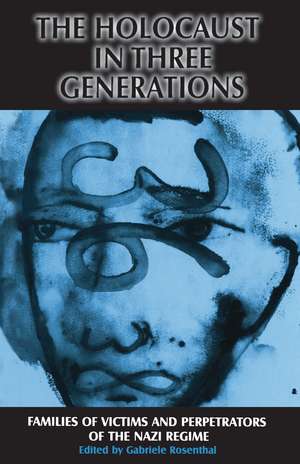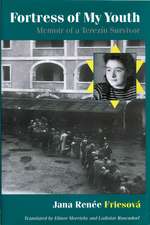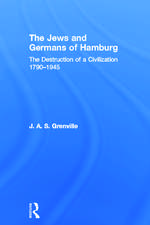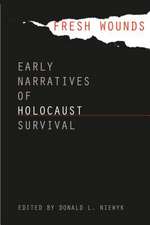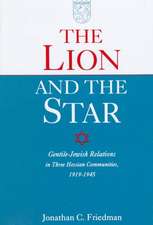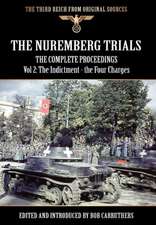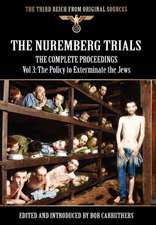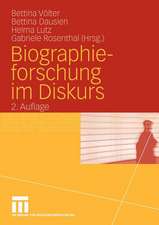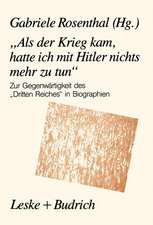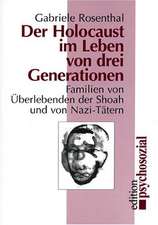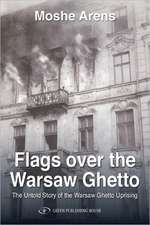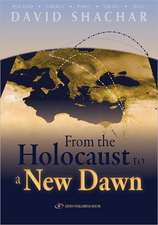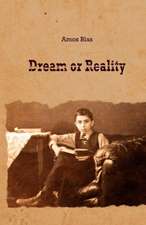The Holocaust in Three Generations: Families of Victims and Perpetrators of the Nazi Regime
Editat de Gabriele Rosenthalen Limba Engleză Hardback – 31 iul 1998
Preț: 1065.07 lei
Preț vechi: 1366.68 lei
-22% Nou
Puncte Express: 1598
Preț estimativ în valută:
203.80€ • 213.22$ • 169.30£
203.80€ • 213.22$ • 169.30£
Carte tipărită la comandă
Livrare economică 02-16 aprilie
Preluare comenzi: 021 569.72.76
Specificații
ISBN-13: 9780304339914
ISBN-10: 0304339911
Pagini: 256
Dimensiuni: 217 x 173 x 29 mm
Greutate: 0.47 kg
Editura: Bloomsbury Publishing
Colecția Continuum
Locul publicării:London, United Kingdom
ISBN-10: 0304339911
Pagini: 256
Dimensiuni: 217 x 173 x 29 mm
Greutate: 0.47 kg
Editura: Bloomsbury Publishing
Colecția Continuum
Locul publicării:London, United Kingdom
Cuprins
Contributors
Translation note
Transcription symbols
Preface
Part I The Dialog about the Holocaust in Families of Survivors and Families of
Perpetrators
1. Questions and method Gabriele Rosenthal
2. Similarities and differences in family
dialog Gabriele Rosenthal
3. Similarities and differences in public
discourse about the Shoah in Israel and West and East Germany
Bettina Volter
Michal Dasberg
Part II Families of Survivors in Israel, West and East Germany
4. Traumatic family pasts Gabriele Rosenthal
5. Surviving together and living apart in
Israel and West Germany: the Genzor family Gabriele Rosenthal
Petra Jordans
Bettina Volter
6. The collective trauma of the Lodz Ghetto: the Goldstern family
Gabriele Rosenthal
Michal Dasberg
Yael Moore
7. Surviving as inmate-functionaries: the Shapiro/Sneidler family
Noga Gilad
Gabriele Rosenthal
Yael Moore
8. Shared and divided worlds: the Stern family
Waltraud Schade
Sabrina Bohmer
Gabriele Rosenthal
9. The Kubiak/Grunwald family dialog:
blocking out the theme of migration from
Israel to East Germany
Maria Nooke in cooperation with
Christine Muller
Part III Israeli Families of Forced Emigrants from Germany
10. Families with grandparents of the `Youth Aliyah generation'
Gabriele Rosenthal
Bettina Volter Noga Gilad
11. A love-hate relationship with Germany: the Arad family
Gabriele Rosenthal
Bettina Volter Noga Gilad
12. The intergenerational process of
mourning: the families of Fred, Lea and Nadja Weber
Gabriele Rosenthal
Bettina Volter Noga Gilad
Yael Moore
Part IV East German Families of Forced Emigrants
13. Remembering in the light of anti-fascism
in East Germany
Bettina Volter
14. Anti-fascism as substitute mourning: the Basler family
Gabriele Rosenthal
Bettina Volter
15. An anti-fascist `legend'?: the Kaufmann family
Bettina Volter
Part V Families of Nazi Perpetrators and
Accomplices in West and East Germany
16. National Socialism and antisemitism in
intergenerational dialog Gabriele Rosenthal
17. Passing the guilt on to the grandchildren: the Sonntag family
Gabriele Rosenthal in cooperation with
Christine Muller
18. We are the victims of history: the Seewald family
Bettina Volter Gabriele Rosenthal
Part VI Two Family Dialogs Compared
19. Veiling and denying Gabriele Rosenthal
Glossary
Bibliography
Translation note
Transcription symbols
Preface
Part I The Dialog about the Holocaust in Families of Survivors and Families of
Perpetrators
1. Questions and method Gabriele Rosenthal
2. Similarities and differences in family
dialog Gabriele Rosenthal
3. Similarities and differences in public
discourse about the Shoah in Israel and West and East Germany
Bettina Volter
Michal Dasberg
Part II Families of Survivors in Israel, West and East Germany
4. Traumatic family pasts Gabriele Rosenthal
5. Surviving together and living apart in
Israel and West Germany: the Genzor family Gabriele Rosenthal
Petra Jordans
Bettina Volter
6. The collective trauma of the Lodz Ghetto: the Goldstern family
Gabriele Rosenthal
Michal Dasberg
Yael Moore
7. Surviving as inmate-functionaries: the Shapiro/Sneidler family
Noga Gilad
Gabriele Rosenthal
Yael Moore
8. Shared and divided worlds: the Stern family
Waltraud Schade
Sabrina Bohmer
Gabriele Rosenthal
9. The Kubiak/Grunwald family dialog:
blocking out the theme of migration from
Israel to East Germany
Maria Nooke in cooperation with
Christine Muller
Part III Israeli Families of Forced Emigrants from Germany
10. Families with grandparents of the `Youth Aliyah generation'
Gabriele Rosenthal
Bettina Volter Noga Gilad
11. A love-hate relationship with Germany: the Arad family
Gabriele Rosenthal
Bettina Volter Noga Gilad
12. The intergenerational process of
mourning: the families of Fred, Lea and Nadja Weber
Gabriele Rosenthal
Bettina Volter Noga Gilad
Yael Moore
Part IV East German Families of Forced Emigrants
13. Remembering in the light of anti-fascism
in East Germany
Bettina Volter
14. Anti-fascism as substitute mourning: the Basler family
Gabriele Rosenthal
Bettina Volter
15. An anti-fascist `legend'?: the Kaufmann family
Bettina Volter
Part V Families of Nazi Perpetrators and
Accomplices in West and East Germany
16. National Socialism and antisemitism in
intergenerational dialog Gabriele Rosenthal
17. Passing the guilt on to the grandchildren: the Sonntag family
Gabriele Rosenthal in cooperation with
Christine Muller
18. We are the victims of history: the Seewald family
Bettina Volter Gabriele Rosenthal
Part VI Two Family Dialogs Compared
19. Veiling and denying Gabriele Rosenthal
Glossary
Bibliography
Recenzii
Details the results of a study undertaken by Israelis and Germans in the two countries between 1992 and 1996, looking at how families of those persecuted by the Nazi dictatorship refer to their past, how their conversations about their family history and the Holocaust differ from those of the perpetrators of the regime and their accomplices, and the impact of the first generation's experience on the lives of later generations.
